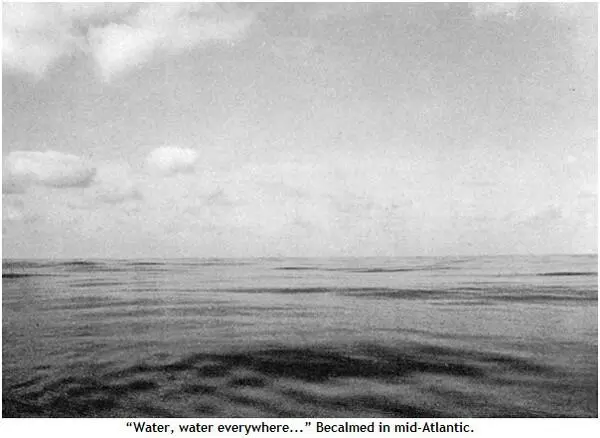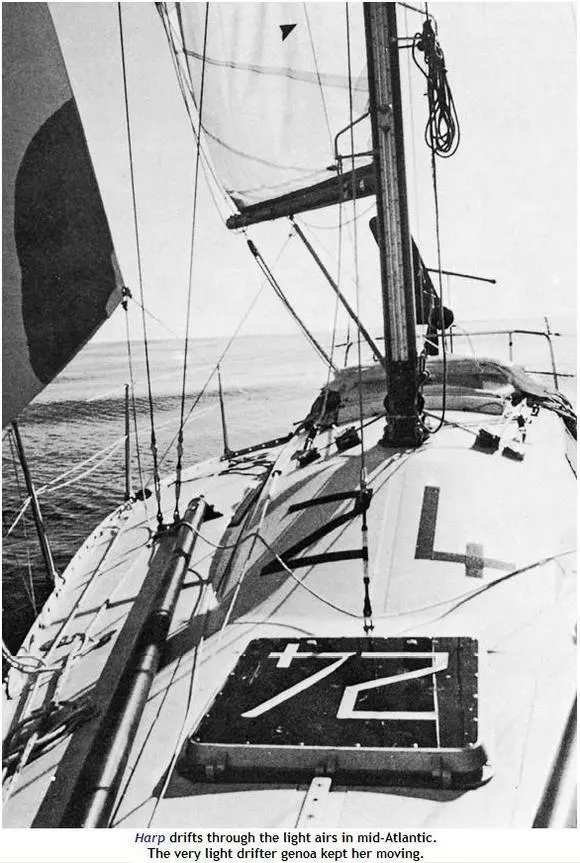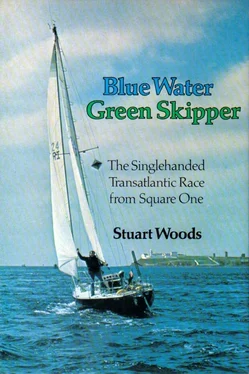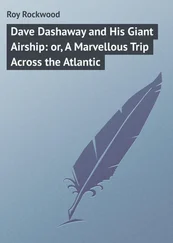During the days, I read as much as I could, finishing Alistair Cooke’s America and starting a biography of Thomas Jefferson. In between, I finished Rosie Swale’s Children of Cape Horn. Rosie had swept through Plymouth, relieving me of £5 for her club of supporters building the Swale’s new catamaran and leaving me with copies of her two books. I ate well. A lunch might include pâté de canard, Parmesan cheese (with the mold sliced off), Bath Oliver biscuits, and half a bottle of Bâtard-Montrachet. I gained weight. I began to cultivate a mustache.
From the radio news I learned that Kriter III, formerly British Oxygen, was reported to be breaking up and Club Méditerranée had been hove-to for three days, repairing sails. There had been a rumor in Plymouth that Colas could not hoist the sails alone, which meant that if he reefed in heavy weather he would not be able to get them up again. I found it difficult to believe that Colas would put himself in that situation, but the word was that there were no winches available big enough for one man to hoist such a huge sail. Somebody else, I didn’t get the name, had been picked up in a life raft.

Then came the really stunning news: there were only ninety-nine competitors left in the race. Thirty-one had retired or been lost. I had, up until this time, heard about only six or seven boats. Thirty-one gone, and it was June 18 — thirteen days after the start of the race! A report came that the Soviet tug Bestroshryy, which had taken ITT in tow, had also taken Yves Terlain off Kriter . He had been able to hold the huge cat together just long enough for help to arrive. Tabarly was reported 850 miles from Newport and it was said that he might be there as early as the twenty-first, which seemed utterly impossible to me.
My first two weeks I had covered 1,066 miles over the ground, probably sailing fifteen or twenty percent more than that because of headwinds. Poor progress. I missed the electricity, especially the instruments, and it annoyed me that when it got dark I simply had to go to bed. I tried reading with a flashlight, but it was very uncomfortable. I was in my sleeping bag by ten and always it took me at least two hours to get to sleep, not being accustomed to early bedtimes. I listened to Willis Conover’s jazz program on the Voice of America, and to the American Forces Radio and Television Service, in addition to the BBC. We were too far out for Radio 2 now, but I was picking up the American station in the Azores again, and getting the first hard news about the coming Democratic Convention in New York. After reading about him for months in the International Herald Tribune, I heard Jimmy Carter’s voice for the first time. He sounded very familiar, like half the people I’d grown up around in Georgia.
I became very subject to reminiscence, something that had happened to me on the return trip from the Azores, too. I found myself easily moved by memories and by things I read or heard on the radio which brought back memories. The Northern Service of the Canadian Broadcasting Company was replaying a series of old radio programs, Inner Sanctum, The Green Hornet, and, best of all, Jack Benny. The CBC and VOA also played a lot of music from other eras, and one evening I suddenly found myself in tears, listening to Bob Hope and Marilyn Maxwell, I think, singing “Baby, It’s Cold Outside.” It’s not a very sentimental song, but I suddenly remembered that when I was about six years old I had known all the lyrics to the male part of that song, and a little girl across the street had known the girl’s part. I remembered sitting under a tree in my grandparents’ front yard on a hot summer day, singing that duet, while we waited for the local fire department to come and rescue a cat which had been chased up the tree we were sitting under by a local dog. What moved me was the memory that I had had a childhood in which firemen came to rescue cats from trees.
On Sunday, June 20, I scored what for me was a navigational triumph. I took my first moon sight, plotted it across a sunsight, and had an instant position without having to wait for a noon sight. It doesn’t sound like much of an event, but after a while alone at sea, small successes become wildly elating, just as small problems become hugely depressing. While I was doing the plotting I looked up from the chart table and saw through the windows on the port side the bows of a huge ship. I ran up on deck, waving and pointing at the signal flags I kept flying, which meant “Report me to Lloyds.” People on deck waved back and, as I watched, the ship made a ninety-degree course change to port and sailed away. Apparently, she had come up on my starboard side, gone astern of me, and then run on a parallel course on my port side to see if there was anybody aboard. I had been too absorbed in plotting my position to hear her engines, close as we were. I wondered what the outcome would have been if the encounter had occurred at night.

The calms and light winds persisted, but very gradually the sea became flatter, until it was not unpleasant to be sailing slowly. My log for Monday, June 21, read, in part: Sitting in the watch seat writing this — a lovely evening. I’m wearing only tennis shorts, and the air feels good on my skin. There is what looks like squally showers up to windward; if it will bring a good sailing breeze that’s O.K. with me. I have been sitting on the “back porch” — the self-steering platform — trailing my feet in the cool water. It is very blue and extraordinarily clear. A fish about eighteen inches long appears to have fallen in love with the rudder — he has been swimming alongside, almost touching it, for hours. We were almost completely becalmed from nine a.m. to four p.m.... Spotted a mooring buoy ahead and after what seemed like a very long time, crept abeam of it. It had the number nine on top and the name (I think) Nancy Egary. The owner can find his mooring at 40°27′N, 27°22′W. Heard on BBC that Tabarly is within a day’s sail of Newport. If it’s true he will beat the record by three days. Seems impossible... The Azores are being even more elusive than on the trip with Bill. Graciosa is still sixty miles away and Flores is a hundred miles further than that...
I was wearing tennis shorts and not running around naked because I had been doing just that, and parts of me which were unaccustomed to the hot sun were complaining. I could sit comfortably only in certain unusual positions. The Azores were, indeed, taking their time about turning up. On the race the year before, Bill and I had taken 15½ days and we had considered that two or three days too long. That night, however, I picked up the loom of a light on Faial and as I was about to go below to plot the bearing, I looked astern and saw two enormous red lights from a position where there could be no land. It was obviously not a ship, and just when I was beginning to reassess my opinions about UFOs, I realized that it was the moon rising, only a sliver of it, but huge and red and broken up by black clouds stretching across it. It was a few minutes before my pulse returned to normal.
Next morning, I could see things growing in my drinking water. This was alarming. I remembered an account by a competitor in the last race describing a similar experience with his water; he had had to put into the Azores to clean his tanks and change the water. If I wanted an excuse to visit Faial again, here it was. I decided to wait another day before making a decision about it. When I checked it again, I found that the contamination was only in the starboard tank and not the port, and I remembered that Yves Anrys had given me two water-purification tablets before the start of the race. I had put them on the chart table and forgotten what they were. Now they were wedged under the barometer and crumbling, but I swept up the pieces, divided them equally between the two tanks, and poured a pint of water in after each of them to make sure they did not lodge in the filler pipes. I reasoned that the contamination was probably harmless bacteria, and anyway, the pills were at work now, so I would drink the starboard tank first, before anything new started growing in it.
Читать дальше














